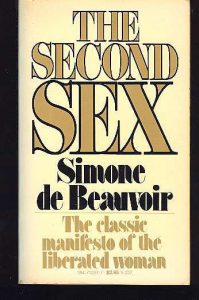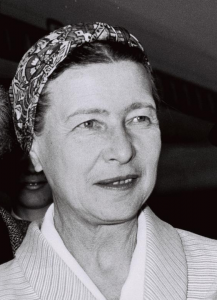Le Deuxième Sexe (The Second Sex) (1949) by Simone de Beauvoir
“Man is defined as a human being and woman is defined as a female. Whenever she tries to behave as a human being she is accused of trying to emulate the male.” – Simone de Beauvoir
The French existentialist philosopher, writer and novelist Simone de Beauvoir (1908-1986) published Le Deuxième Sexe (The Second Sex) in French in 1949. The book was translated into English in 1951. Its first reception was quite critical, but today the book is considered by many to be the “bible” of modern Western feminism, the impetus for the intellectual feminist revolution of the new women’s movement that started in the late 1960s in Western Europe and North America. The Second Sex critically explores what it was like in past and present times to live as a woman in a patriarchal world. In her book, Simone de Beauvoir challenges the long-held notion that gender differences are based on biological differences and that women therefore are inherently inferior beings to men. She argues that women’s inferior position to men has been historically constructed. De Beauvoir intelligently used multiple lenses of analysis to approach the subject of women’s oppression and successfully illustrate the way sexism works within modern society.
The three frames of reference that Simone de Beauvoir uses to make her argument in the The Second Sex are historical materialism, existentialism, and psychoanalysis. In terms of historical materialism, de Beauvoir details how social and economic conditions and class have a role in shaping history, particularly for women. Women are trapped by men financially and socially and completely dependent upon them with no real power. Adopting an existentialist lens, the book emphasizes personal freedom and choice and argues for the social, not biological, construction of femininity. Human nature is not fixed at birth, but rather molded by circumstances. For women, de Beauvoir makes the argument that women are not born knowing what it means to be a woman- how to behave, what jobs to do, how to feel- but are rather socialized into the role of ‘woman.’ The last main frame of reference is psychoanalysis in which de Beauvoir critically examines the causes of human behavior and seeks to dismantle the socio-cultural assumptions people have about femininity.
With 978 pages in two volumes, The Second Sex is a dense, well-argued critique of patriarchy. The book faced much criticism and ridicule when it was first released, as de Beauvoir revealed a long-ignored truth to a society still recovering from mass changes, both institutional and cultural, caused by World War II. Because of its attack on traditional marriage roles and what some critics characterized as pornographic elements, the book was on the Vatican’s list of forbidden texts.
To a modern reader, some of the arguments made by Simone de Beauvoir in The Second Sex might seem outdated and very obvious, which is a sign of progress, but some of what she argues also has not come to realization in the seventy years since its publication. For example, many people today would not dispute the fact that women have been historically subordinated or oppressed by men. However, some of those same people might still believe in the biological differences between the sexes and think that a gender division of labor which relegates women into the home and family is “natural,” especially if a couple has children. The Second Sex was important for its time, because it challenged the believe in the “natural causes” for the differences between men and women and called for a change of the gender relations and gender hierarchy in the economy, society, politics and culture. It is also important for modern audiences because it shows how far society has come in terms of recognizing women’s rights and oppression in the last seventy years.
Emma Haseley, History and Women’s and Gender Studies double major, Studio Art minor, Class of 2020
Sources
Literature and Websites
- Dini, Rachele. An Analysis of Simone de Beauvoir’s The Second Sex. Macat International Ltd. London, UK 2017.
- “Simone de Beauvoir.” Wikipedia, at: https://en.wikipedia.org/wiki/Simone_de_Beauvoir (Accessed 19 April 2018)
- Simons, Margaret A. Beauvoir and The Second Sex : Feminism, Race, and the Origins of Existentialism. Lanham, Md.: Rowman & Littlefield Publishers, 1999.
- Tidd, Ursula. Simone de Beauvoir. Reaktion Books Ltd. London, UK: 2009.
- Weitz, Margaret. “Simon de Beauvoir’s Legacy. Contemporary French Civilization 11, no. 2 (1987): 240-243.
Images




